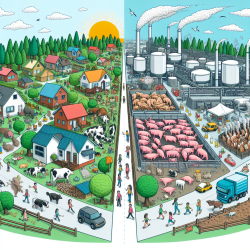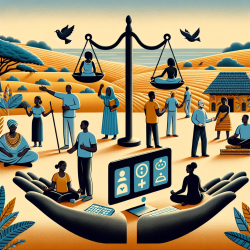As a passionate advocate for children’s speech and language development, it is crucial to understand the broader context in which they grow and learn. The recent research article, "Strengthening the social resilience of people living at the intersection of precariousness and migration during pandemics: action recommendations developed in Munich, Germany," offers valuable insights that can be applied to enhance our online therapy services at TinyEYE.
Understanding the Context
The study conducted in Munich, Germany, underscores the unique challenges faced by migrants living in precarious conditions during the COVID-19 pandemic. These challenges include limited access to COVID-19 prevention measures, deteriorating living conditions, and reduced social support. By understanding these factors, we can better tailor our online therapy services to meet the needs of children in similar situations.
Key Findings and Action Recommendations
The research identified several vulnerability and resilience factors across three domains: COVID-19 prevention, human rights and living conditions, and social support. Here are some key findings and their implications for online therapy:
- Access to Information: Limited access to reliable information was a significant barrier. For our online therapy sessions, this means ensuring that parents and caregivers have clear, accessible information about how to support their children's speech and language development.
- Living Conditions: Crowded and unstable living conditions exacerbated stress and hindered learning. Our therapists can offer strategies for creating a conducive learning environment, even in challenging circumstances.
- Social Support: The pandemic disrupted traditional support systems. We can incorporate social support elements into our therapy sessions, such as group activities that foster peer interaction and support.
Implementing the Research Findings
Based on the study’s recommendations, here are some actionable steps we can take to enhance our online therapy services:
- Tailored Communication: Develop multilingual resources and ensure that all communication is clear and culturally sensitive. This can help bridge the information gap and build trust with families.
- Flexible Scheduling: Offer flexible scheduling options to accommodate the varied and often unpredictable schedules of families living in precarious conditions.
- Enhanced Support Networks: Facilitate virtual support groups where parents can share experiences and strategies, thereby creating a community of support.
Encouraging Further Research
While the findings from Munich provide a solid foundation, further research is needed to explore the specific needs of children in different contexts. Practitioners are encouraged to conduct localized studies and share their findings to build a more comprehensive understanding of how to support children living in precarious conditions.
Conclusion
The intersection of precariousness and migration presents unique challenges that require tailored, data-driven solutions. By implementing the recommendations from the Munich study, we can enhance the effectiveness of our online therapy services and contribute to the social resilience of children in these vulnerable situations.To read the original research paper, please follow this link:
Strengthening the social resilience of people living at the intersection of precariousness and migration during pandemics: action recommendations developed in Munich, Germany.










